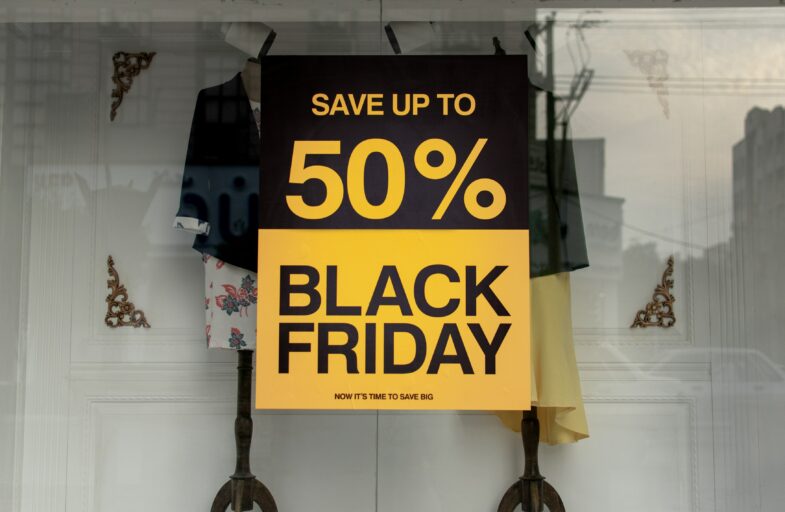Photo by Ashkan Forouzani on Unsplash
For store owners, the holiday season is the best time of year for sales. This year you can maximize that prep with these Christmas 2020 trends, predictions, and tips.
Because most retail shopping will happen online – as the world is in a pandemic – this is the ideal time for smaller online stores to create more revenue and gain customers that will remain after a seasonal spike in sales.
Christmas 2020 Trends
Christmas is less than 100 days away. Most major retailers start prepping for the holiday season in early June, which is to be expected, as retailers make billions of dollars in less than 30 days from holiday purchases.
Smaller businesses don’t have that luxury. But one thing smaller businesses can do to compete with larger retailers is to familiarize themselves with trends. Doing this will help you better prepare for the season ahead.
Longer Buying Season
Black Friday is known as the official start of the holiday shopping season. However, data reveals that the holiday shopping season has a soft-start at the beginning of November, just after Halloween.
Which means shoppers already begin their search for gifts at this time. Besides the search for gifts, consumers are also on the lookout for pre-Black Friday discounts, as consumers prefer shopping at stores with coupons, discounts, and sales.
On average, shoppers will spend $200 on gifts before Black Friday.
As a savvy online store owner, you can ensure you’re at the front of potential and returning customer’s minds by beginning your holiday ads and seasonal discounts at the start of November.
Black Friday & Cyber Monday Sales Increase
Black Friday officially kicks off the holiday season. This year, as previously stated, most of the sales are expected to occur online. Therefore, even traditional brick and mortar businesses will want to find a way to list their products online. Remember that unlike a physical store location, shoppers can have many tabs open, shopping across many different stores – there’s no reason your store can’t be one of those tabs.
In preparation for Black Friday, you should schedule all sales to go live at midnight. Doing this will increase fanfare but also help you capture the attention of shoppers who are ready to purchase.
Tip: Plan your Facebook, Twitter, Instagram, and Google ads the week preceding Black Friday, and ensure many of them go live on the day, so eager shoppers can click and buy your Black Friday deals when they go live.
Cyber Monday is slowly breaking free from being a Black Friday afterthought, to become one of the second biggest shopping days of the year. Traditionally, Cyber Monday is about discounts on tech, but now consumers expect discounts on most items on sale at an online retailer.
Increase In Purchases Completed on Apps
Based on previous data, it’s safe to assume that during the Christmas 2020 holiday season, more shoppers will interact with e-commerce stores using apps.
If you’re managing a standalone online store, you may want to consider getting an app built for your store. However, if you’re using a platform like Etsy, you can optimize your products so they display better in the app.
Tip: If you haven’t downloaded your platform’s app, now is the time to do it so. By downloading the app, you have a better understanding of how to optimize your products.
Shoppers Relying on User Generated Content
Start accumulating reviews before the season officially kicks in. In the run-up to Black Friday, you want to accumulate as many Google reviews and product reviews as possible. Consumers rely heavily on user-generated content like reviews to determine whether they should purchase an item, especially if they haven’t bought from a store before.
You can also use glowing reviews about your store in your ads.
Tip: To encourage customers to leave reviews, start a campaign giving away items or discounts to reviewers of the previous week or month.
Christmas 2020 Predictions
Infrastructure Failure
It’s common for big names to endure an outage or two on Black Friday and Cyber Monday. Even after years of this happening repeatedly, it’s likely that stores won’t predict the traffic that will flood their online stores on Black Friday and Cyber Monday.
Of course, this year, there’ll be even more to contend with as shoppers who may have made use of in-store deals will choose to purchase their items online.
To prepare for this event, you need to be in contact with your hosting provider. Find out if your store – and particularly their servers – can handle the increase in simultaneous traffic. Remember, if you’re on a shared hosting subscription, it only takes one store in your group to negatively affect your store, so you may want to consider getting a dedicated server before the holiday season kick-off.
Emphasis on Company Values
This holiday season, shoppers are going to be looking at your store’s values as part of their purchasing decisions. Shoppers aren’t only purchasing an item, they’re purchasing a brand and alongside it – the brand’s values.
If your core message fits into the narrative of the buying majority, be sure that it features prominently on your store so that shoppers are more inclined to use your store over others.
Digitally, even more so than in stores, there’s variety. What will make shoppers buy from your store when there are several other options available to them?
Celebration of Diverse Beliefs/ Traditions
Although Christmas is the most popular holiday, if you’re catering to a global audience, other holidays feature prominently on the calendar at the same time of year. Depending on the location of your store and what other markets you want to expand to, you should start researching about these holidays and beliefs. This strategy will also enable you to extend the Holiday season into January.
Christmas 2020 Preparations
Optimize Shipping
One of the best things you can do to improve your sales during the holiday season is to offer free shipping. Free or reduced shipping is going to compel your buyers to act. Research shows that if there’s a free shipping threshold, customers are more likely going to try to reach that free shipping threshold.
Because free shipping is so common, if you want to be a contender with bigger names, you’ll want to do some cost analysis to determine how you can incorporate free shipping into your holiday strategy.
Delay Notices
This year USPS and other courier services will have to contend with a global pandemic and increase in online orders. Therefore, you’ll need to prepare your customers for shipping delays, and avoid making promises that are impossible to keep. It’s a good idea to consider extending your minimum shipping dates to deal with the increase in postal services and perhaps remove next day delivery as an option if you’re unable to keep up with demand.
Prepare Your Discounts
Even if your store isn’t that popular, you can still make use of coupons to drive sales. You can start by submitting coupon codes to coupon apps and sites like Retailmenot. You should also prepare a dedicated section on your website for coupons, this way when customers are searching for [Your Business Name] coupon, your website will be one of the first to appear on search.
Develop Your Post-Season Strategy
Before the Holiday Season shopping boom ends, you need to begin developing your post-season strategy.
Your sales aren’t only limited to the Christmas season. In fact, it’s best to prepare your strategy for one of the slowest months for retail in the year: January.
If you’ve had a successful holiday season in sales, you may not have excess Holiday season themed items. Due to the seasonal nature of many Christmas inspired products, you should already begin planning ways to offload excess stock. Therefore, you’re breaking even and aren’t stuck with a bunch of items that will be irrelevant in Christmas 2021.









